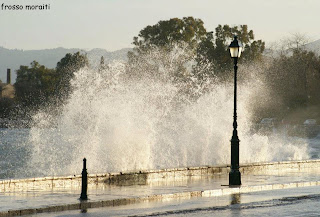Barbarossa? Read on, all will be made clear.
I never intended my blog to become a soapbox for the airing of political grievances or economic solutions. I leave that to others.
I wanted it to be a little voice of gentle humour spiced with some nuggets of interesting information, some alternative perspectives.
But I cannot ignore what is going on in this country that I love so much and that I call home.
I have lived here for so many years – over half my adult life, and while I know that I can never say ‘I am a Greek’. I am proud to say that I feel like a Greek.
I feel passionate about the country and its history and its people, and I feel the anger and humiliation and helplessness the Greeks are currently experiencing. What am I saying? That WE are experiencing. I live here, and Greece
I have to confess to a deep sense of disappointment in the way Greece
That is not the Greece
What a fine way to repay all that Greece
“Now is the Winter of our Discontent’ said Richard III. Sure is Rick.
But in Corfu , even winter discontent is rapidly dispersed by one of those unique Corfu Moments. Driving back from a visit to friends on Sunday, a visit that began with a lifting of the clouds, a suggestion of sunshine, we were driving along the road that skirts the Bay of Garitsa in Corfu Town
On Sunday it was less dramatic – the wind was from a different direction and the bay was sheltered, but the entire area was devoid of any detail, like a very old, very faded sepia photograph. The Old Fortress loomed out of the dimness, but sea and sky merged in a colourless blur.
Oddly enough we didn’t feel depressed or anxious, though the scene before us could have been the epitome of the national mood.
We were a family together, three generations, warm, finding pleasure in the austere beauty of Garitsa in winter.
I thought Nikolas was offering me a dish of olives, black, a little shrivelled, but the aroma that emanated from them was that of tsipouro. Intrigued, I tried one, and then another, and then… it became hard to stop. Nikolas was smiling and mysterious, pleased that I liked his offering, making me guess what the little fruits were.
Eventually he relented and told me not only what they were – figs, which I had managed to guess – but how this delectable sweet was made.
The small purple figs, from his own garden, had been dried in the sun beneath a protective covering of muslin and were then steeped for days in a syrup made from tsipouro to which the following had been added: bay leaves, fennel seeds, cloves, black pepper, vanilla, lemon, cinnamon and mastica – and one more thing, something that Nikolas called ‘barbarroza’ which flummoxed me completely and sent me on a quest! I searched the Internet amd then asked my truly Corfiot friends - I should really have done this the other way round - and learned that what he called by this oddly piratical name was in fact arbaroriza which is the rose-scented pelargonium, called ‘nutmeg geranium’ in England Greece
The leaves are used to flavour quince preserves, loukoumi and ice creams.
But here in Corfu it finds its way into this wonderful fig preserve and also into the famous fig-cakes of Corfu (sykomaitha). These are formed of the above ingredients worked into a paste with chopped figs, ouzo or tsipouro, then shaped into a small cake and wrapped in fig, vine or chestnut leaves.
I’m assuming you all know what tsipouro is – (not to be confused with tsipoura – a type of fish – and now I have confused you haven’t I?) Tsipouro is a very strong alcoholic drink, similar to grappa, about 45% proof. It is made from the residue of the wine press, and was once illegally brewed privately. Now it has become ‘respectable’ and even fashionable. I had the great pleasure, however, of drinking it when it was still illegal and hidden under the bed of my hosts in Arachova. I have no recollection of what happened after the first glassful. It certainly banished winter and all its discontents.
After that boozy digression, I leave you with food for thought.
The town of Villamayor de Santiago , in Spain Spain
Well, why not?
According to a recent study by Spain
No comment.
On a lighter note, and to bring today’s blog to its conclusion:
Over a million UK
Back seat driver of indeterminate age!
Cheering thought for the oldies amongst us, though not perhaps if you are a pedestrian living in the same area as these ancient and probably stubborn motorists!
Thanks to Frosso for allowing me to use some of her photos. Others are by me and my sister.










Lovely,inoffensive blog Ang.,lets me wander those hills and roads with you.
ReplyDeleteMy heart grieves for Corfu and Greece,and i really wish for an upturn in the economy. I will certainly be back, and hope for some figgy delights!
...και εγώ επίσης! http://democracystreet.blogspot.co.uk/2012/07/what-greeks-went-through.html
ReplyDeleteI will link your blog to mine. S